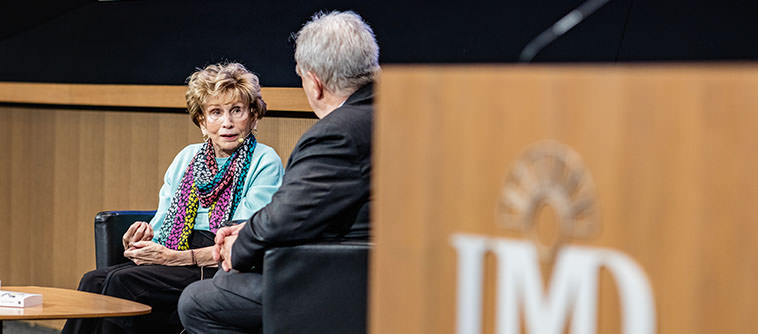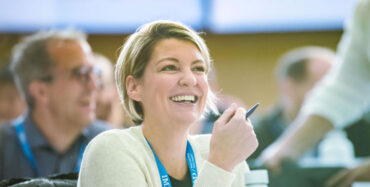“We all have a story, but I refuse to be my story. I was victimized, but I am not a victim.”
On Wednesday 8 May, IMD was honored to host a truly inspiring woman, Dr Edith Eva Eger, who addressed the school’s community with lessons drawn from her journey from one of the most traumatic events in modern history to an extraordinary life and work spreading a message of positivity.
Dr Eger, known as ‘The ballerina of Auschwitz,’ one of the last survivors of the infamous WWII concentration camp, aged 91, is an internationally-renowned psychotherapist and bestselling author of ‘The Choice.’
Invited to IMD as a guest speaker in the High Performance Leadership Program, Dr Eger joined IMD’s alumni, faculty and staff for a moving discussion on stage with IMD Professor and hostage negotiator George Kohlrieser, and the audience.
She was sixteen years old when she was deported to Auschwitz in 1944. Her parents were killed immediately on arrival. On 4 May 1945 a young American soldier noticed her hand moving slightly amongst a number of dead bodies. He quickly summoned medical help and brought her back from the brink of death.
Dr Eger’s life story is an extraordinary example of leadership, illustrating the power of mindset and how everything that happens to us in life, including painful and traumatic experiences, can be transformed into a source of inspiration and to focus on what is possible instead of on all that is impossible. Dr Eger survived because of her attitude about life, her courage, her willingness to forgive, and her ability to focus beyond the enormous pain and suffering to a future beyond the camp. She says she learned all there is about life in Auschwitz and sees the experience as a gift.
“Time doesn’t heal. It’s what you do with the time. Healing is possible when we choose to take responsibility, when we choose to take risks, and finally, when we choose to release the wound, to let go of the past or the grief.” The Choice
Highlights from the event:
“Dr Eger has an incredible zest for life,” said IMD President and the Nestlé Professor Jean-François Manzoni during the evening’s opening remarks.
“She has lived through hell and she has come out of it with such an inspiring way to look at life. Your history is your history, but the most important thing is how you decide to live in the present. She is a true model of what leadership is: Leading self, leading others and leading organizations. She has such a positive attitude about post-traumatic strength. At 91, life is an adventure for her. She is a fighter. She believes in what she does. She sees beauty all around. She is here to tell her story about what she went through and how you can come out on the other side and live your life to the fullest with joy,” said Professor George Kohlrieser introducing Dr Eger.
“We all have a story, but I refuse to be my story. I was victimized but I am not a victim. I am equipped to guide others from victimization to empowerment. Life is just one day. The morning sunshine is not coming back. I am in the twilight of my life. I want to die happy. In May 1944 I arrived in Auschwitz and was taken from a cable car to a line. I was there with my sister Magda, who is alive and well. The guards pointed my mother to the right and me and my sister to the left. The guard said: “You will see your mother again. She is going to take a shower,” said Dr Eger introducing herself. She never saw her mother again.
A dancer in Hungary before being taken to the concentration camp, Dr Eger explained how she earned the name ‘The ballerina of Auschwitz’: “I was asked to entertain someone, and I didn’t know who it was at the time. It turned out to be Dr Mengele, the angel of death. I danced ‘The Blue Danube’ in front of the Nazi soldiers imagining myself back in the theatre in Hungary.”
On going from her harrowing experience to her inspiring life’s work, Dr Eger said: “Today I work with men and women who have experienced trauma in their lives. I help them realize that they can be survivors and not victims. We cannot change the past. Remorse is very different than regret. Forgiveness doesn’t mean that you forget; It means that you don’t want to be carrying anything with you that will make you a victim.”
Professor Kohlrieser: “You did not get pulled into the negativity. In Auschwitz you saw the worst come out in people, and you also saw the best.”
Dr Eger: “It really revealed if you were a giver or taker. Dr Mengele gave me a piece of bread after I was finished dancing and I shared the bread with the other girls. Later when I was on a death march, I was slowing down. And when you slow down, they shoot you. The girls to whom I previously gave the bread formed a human chair to carry me and saved my life.”
Dr Eger: “My mother told me that they can take away everything, but they can’t take away your mind.“
Dr Eger: “We have temptation to teach us freedom of choice.”
Professor Kohlrieser: “Did you ever question how God can allow such evil to happen?”
Dr Eger: “God did not kill my parents, people did. People tell me you overcame; No, I didn’t. I still remember when German children would spit on us and call us names. But I moved on. Now I work at an American military base and work with a German family whose daughter jumps on my lap and calls me Oma.”
Professor Kohlrieser: “What keeps you inspired?”
Dr Eger: “Curiosity. I always want to know what’s going to happen next. I never wanted to give up. Auschwitz was an opportunity to discover how I can make it when I can’t control what is outside of me.”
Professor Kohlrieser: “How do you help people to get to the point of making a choice and getting over their pain?”
Dr Eger: “I can’t help people who don’t want to help themselves.”
“Rejection is a word that is used to describe how you feel when you don’t get what you want. Get over the drama. Nobody rejects you but you.”
“Curing is done by doctors. Healing is an inside job.”
Professor Kohlrieser: “What would you say to the young generation?”
Dr Eger: “I am handing you the torch.”
Asked by a member of the audience who is a survivor of the Balkan conflict how to apply her lessons to alleviate hatred in that part of the world, Dr Eger said: “There is no love without hate; No life without death. Acknowledge the seasons of life. We should empower each other with our differences. Encourage a dialogue with victims and victimizers.”
Dr Eger on her fundamental message for children about holocaust: “Children need someone to let them know that they have a choice. Children need to know how to be realistic rather than idealistic.”
Professor Kohlrieser: Do you see the world getting better or worse?
Dr Eger: “Right now we are very separated. I am totally hoping that there will be a time when we realize that there is enough of that. We can do better than that.”
Dr Eger on the survival mindset: “To be a survivor is to be flexible. Not blaming. If you can change your thinking you can change your whole life. You must find hope amidst hopelessness; A goal. It must be followed by action.”
Professor Kohlrieser brought an emotional participant on stage who said he was born in the last weeks of World War II in Germany, who asked Dr Eger, “How do you not hate Germans?”
Dr Eger: “I felt sorry for them. I decided that they are the victims and not me.”
Summing up her inspirational attitude toward life, Dr Eger said: “My faith was discovered in Auschwitz. I discovered the greatest gift to enjoy life. To celebrate every moment.”
The discussion was followed by a cocktail reception and participants received a copy of Dr Eger’s book ‘The Choice’.
Special thanks to Dr Eger’s daughter, Audrey, who travelled with her from the United States to the Netherlands and on to IMD. Many thanks too to Jakob van Wielink, IMD Coach, who first reached out to Dr Eger – inviting her to tour European cities, and to Professor George Kohlrieser for extending the invitation to Dr Eger to participate as the keynote speaker in the High Performance Leadership (HPL) program from 5-8 May 2019 and initiating the IMD community session.
Watch full video of the livestreamed session here.



